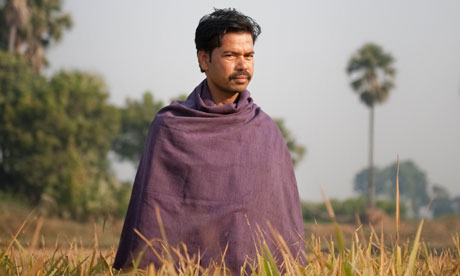
Posted on 03/18/2013 11:44:07 PM PDT by JerseyanExile

Sumant Kumar was overjoyed when he harvested his rice last year. There had been good rains in his village of Darveshpura in north-east India and he knew he could improve on the four or five tonnes per hectare that he usually managed. But every stalk he cut on his paddy field near the bank of the Sakri river seemed to weigh heavier than usual, every grain of rice was bigger and when his crop was weighed on the old village scales, even Kumar was shocked.
This was not six or even 10 or 20 tonnes. Kumar, a shy young farmer in Nalanda district of India's poorest state Bihar, had – using only farmyard manure and without any herbicides – grown an astonishing 22.4 tonnes of rice on one hectare of land.
It beat not just the 19.4 tonnes achieved by the "father of rice", the Chinese agricultural scientist Yuan Longping, but the World Bank-funded scientists at the International Rice Research Institute in the Philippines, and anything achieved by the biggest European and American seed and GM companies. And it was not just Sumant Kumar. Krishna, Nitish, Sanjay and Bijay, his friends and rivals in Darveshpura, all recorded over 17 tonnes, and many others in the villages around claimed to have more than doubled their usual yields.
The villagers, at the mercy of erratic weather and used to going without food in bad years, celebrated. But the Bihar state agricultural universities didn't believe them at first, while India's leading rice scientists muttered about freak results. The Nalanda farmers were accused of cheating. Only when the state's head of agriculture, a rice farmer himself, came to the village with his own men and personally verified Sumant's crop, was the record confirmed.
(Excerpt) Read more at guardian.co.uk ...
makes logical sense. fewer plants, greater spacing, super yield from a healthier plant. all from a jesuit. figures.
Sounds like it might be more hype than reality.
no problem. if you’ve got a farm or garden, replicate it for yourself. this is a case where you’re the scientist if you really want to know.
I read the entire excellent article and it sounds as though it is sound science. The problem is, the process is more labor intensive and suites the small independent farmers and not the big agri-businesses.... More power to the people... Who when empowered are more difficult to control.
Thanks. Very interesting article. Makes me want to try it myself.
HUH! That’s marvelous for subsistance farmers unfortunately for the industry here when everyone has a good crop the prices drop.
Monsanto can’t be happy with this.
These outcomes are being published in the Journal of Irreproducible Results.
Good for Kumar & company, especially in a country where feast can so easily turn to famine for millions.
Some of the scientists seem skeptical...or jealous.
Well, rice doesn’t grow well in the inter-mountain west, so I won’t be trying it myself.
The problem I see with the not reproducible results is that some farmers may bust their hump and their families humps trying it out. They’ll only do it one season though if it doesn’t pay off.
If it does work and causes a rice glut, prices will go down and then farmers will be out tremendous effort for lower prices. The early adopters will reap a temporary increased profit before increased supply lowers prices, which may null the value of the additional labor and increased yeild.
Independent India has never had a famine. The Indian government holds among the largest quantity of food stocks in the world & the only problem is of plenty. India might end up hammering down prices in the international market trying to get rid of some of the stock.
Disclaimer: Opinions posted on Free Republic are those of the individual posters and do not necessarily represent the opinion of Free Republic or its management. All materials posted herein are protected by copyright law and the exemption for fair use of copyrighted works.